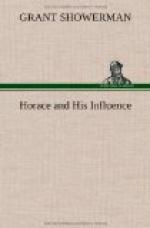4. HORACE THE PHILOSOPHER OF LIFE
HORACE THE SPECTATOR AND ESSAYIST
A great source of the richness of personality which constitutes Horace’s principal charm is to be found in his contemplative disposition. His attitude toward the universal drama is that of the onlooker. As we shall see, he is not without keen interest in the piece, but his prevailing mood is that of mild amusement. In time past, he has himself assumed more than one of the roles, and has known personally many of the actors. He knows perfectly well that there is a great deal of the mask and buskin on the stage of life, and that each man in his time plays many parts. Experience has begotten reflection, and reflection has contributed in turn to experience, until contemplation has passed from diversion to habit.
Horace is another Spectator, except that his “meddling with any practical part in life” has not been so slight:
Thus I live in the world rather as a Spectator of mankind than as one of the species, by which means I have made myself a speculative statesman, soldier, merchant, and artisan, without ever meddling with any practical part in life. I am very well versed in the theory of a husband, or a father, and can discern the errors in the economy, business, and diversion of others, better than those who are engaged in them: as standers-by discover blots which are apt to escape those who are in the game.
He looks down from his post upon the life of men with as clear vision as Lucretius, whom he admires:
Nothing is sweeter than to dwell in the lofty citadels secure in the wisdom of the sages, thence to look down upon the rest of mankind blindly wandering in mistaken paths in the search for the way of life, striving one with another in the contest of wits, emulous in distinction of birth, night and day straining with supreme effort at length to arrive at the heights of power and become lords of the world.
Farther, Horace is not merely the stander-by contemplating the game in which objective mankind is engaged. He is also a spectator of himself. Horace the poet-philosopher contemplates Horace the man with the same quiet amusement with which he surveys the human family of which he is an inseparable yet detachable part. It is the universal aspect of Horace which is the object of his contemplation,—Horace playing a part together with the rest of mankind in the infinitely diverting comedie humaine. He uses himself, so to speak, for illustrative purposes,—to point the moral of the genuine; to demonstrate the indispensability of hard work as well as genius; to afford concrete proof of the possibility of happiness without wealth. He is almost as objective to himself as the landscape of the Sabine farm. Horace the spectator sees Horace the man against the background of human life just as he sees snow-mantled Soracte, or the cold Digentia, or the restless Adriatic, or




